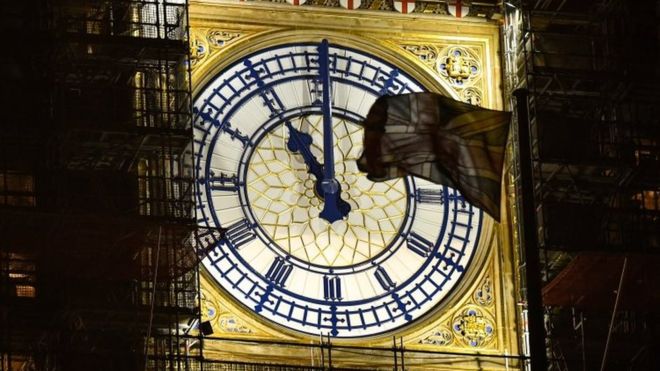
The UK will leave the EU at 23:00 GMT, ending 47 years of membership.
In a video message to be released an hour earlier, Prime Minister Boris Johnson will call Brexit – which follows more than three years of political wrangling – a “new dawn”.
A series of events including marches, celebrations and candlelit vigils will be held by both Brexiteers and pro-EU demonstrators.
Little will change immediately, as the UK begins a “transition period”.
Most EU laws will continue to be in force – including the free movement of people – until the end of December, by which time the UK aims to have reached a permanent free trade agreement with the EU.
Labour leader Jeremy Corbyn said the country had to “move on” after Brexit and needed to “make sure we maintain good relations” with the EU and not “fall into the arms of a free tree deal with the United States”.
The Archbishop of Canterbury, Justin Welby, told BBC Radio 4’s Today programme the UK “must be united in a common vision for our country, however great our differences on achieving it”.
Former Prime Minister David Cameron, who led the campaign to remain in the EU during the referendum, called it a “very big day for our country”, adding that he believed the UK could “make a success of the choice that we made”.
And Brexit Party leader Nigel Farage said: “At last the day comes when we break free. A massive victory for the people against the establishment.”
Brexit was originally scheduled for 29 March last year but was repeatedly delayed when MPs rejected a previous withdrawal agreement reached by the EU and former Prime Minister Theresa May.
Mr Johnson was able to get his own deal through Parliament after winning December’s general election with a House of Commons majority of 80, on a pledge to “get Brexit done”.
This brought to an end more than three years of political argument, following the referendum, in which 52% of voters backed leaving the EU.
The prime minister is holding a cabinet meeting in Sunderland – the city that was the first to back Brexit when results were announced after the referendum.
In his message, Mr Johnson, who led the 2016 campaign to get the UK out of the EU, will attempt to strike an optimistic, non-triumphalist note.
“The most important thing to say tonight is that this is not an end but a beginning,” he will say in a message filmed in Downing Street.
“This is the moment when the dawn breaks and the curtain goes up on a new act. It is a moment of real national renewal and change.”
Brexit Party MEPs, including Ann Widdecombe, left the European Parliament in Brussels led by a bagpiper.
Supporters of the EU are expected to take part in a procession through Whitehall at 15:00 GMT to “bid a fond farewell” to the union.
Later, Brexiteers will gather in Parliament Square for a celebration, and a clock counting down to the moment the UK leaves the EU will be projected on to Downing Street.
Buildings along Whitehall will be lit up and Union flags line Parliament Square.
A new commemorative 50p coin will also come into circulation to mark the UK’s withdrawal.
However, Big Ben will not chime at 23:00 GMT due to ongoing renovation works.
Mr Johnson will host a reception in Downing Street for cabinet ministers, No 10 advisers, civil servants, those involved in the negotiations and supporter of the campaign to leave the EU.
They will be served English sparkling wine and a selection of canapés including fillet of lamb on toast, Shropshire blue cheese, beef and Yorkshire pudding with horseradish sauce, mushrooms tarts and roast chicken skewers.
In Brussels, the UK flag will be removed from the EU institutions, with one Union flag expected to be consigned to a museum.
European Commission President Ursula von der Leyen paid tribute to UK citizens who had “contributed to the European Union and made it stronger”.
“It is the story of old friends and new beginnings now,” she said. “Therefore it is an emotional day, but I’m looking forward to the next stage.”
Upcoming negotiations would be “fair” but each side would fight for its interests, she added.
But European Council President Charles Michel warned that UK access to EU markets would be more restricted after Brexit.
“The more the UK will diverge from the EU standards, the less access to the single market it will have,” he said.
Irish Deputy Prime Minister Simon Coveney told Sky News he thought the EU and UK would struggle to reach a trade deal during the 11-month transition period, as there was “too much to agree”.
In a speech in Edinburgh, First Minister Nicola Sturgeon said Scotland was being “taken out of the European Union against the wishes of the overwhelming majority” of its people.
She argued that Scotland had “the prospect of a brighter, better future as an equal, independent European nation”.
Speaking in Cardiff, Welsh First Minister Mark Drakeford – who campaigned for Remain in the referendum – said Wales was leaving the EU “with our heads held high”, adding: “Wales remains a European nation.”
Wales voted to leave the EU at the 2016 referendum by 52.5% to 47.5%.
Liberal Democrat acting leader Sir Ed Davey vowed his pro-EU party would “never stop fighting” to have the “closest possible relationship” with Europe.
He said it would be on a “damage-limitation exercise to stop a hard Brexit hurting British people”.
Source: BBC NEWS

